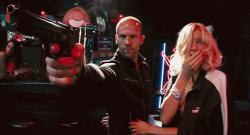 I first encountered Monika Treut when wandering the aisles of The Video Station, the great video-rental emporium in Boulder, Colorado, where her playful, enigmatic, and slightly unsettling lesbian art film Virgin Machine sported perhaps the most provocative box art in the entire German-language section. I liked Virgin Machine a lot. But then there are many things I liked a lot in 1989 that I'd be vaguely embarrassed by today. After I finished watching Ghosted, Treut's newest film, I found myself digging out my decades-old VHS copy of Virgin Machine to try and square my memories of Treut's earlier film with my experience of her latest. Virgin Machine still seemed weird and wonderful, and its star Ina Blum, first researching the idea of romantic love in Germany, then searching for her mother in the Oz of San Francisco, felt like she could be Treut's Anna Karina, her face and form the text and subtext of so many shots early in the film, before Susie Bright (nee Sexpert) shows up and helps her learn to have fun exploring eroticism. Its black-and-white, borderline expressionist aesthetic aside, Virgin Machine feels a little like an early Godard film where the anti-capitalist screeds have replaced by cheerful pro-sex polemics.
I first encountered Monika Treut when wandering the aisles of The Video Station, the great video-rental emporium in Boulder, Colorado, where her playful, enigmatic, and slightly unsettling lesbian art film Virgin Machine sported perhaps the most provocative box art in the entire German-language section. I liked Virgin Machine a lot. But then there are many things I liked a lot in 1989 that I'd be vaguely embarrassed by today. After I finished watching Ghosted, Treut's newest film, I found myself digging out my decades-old VHS copy of Virgin Machine to try and square my memories of Treut's earlier film with my experience of her latest. Virgin Machine still seemed weird and wonderful, and its star Ina Blum, first researching the idea of romantic love in Germany, then searching for her mother in the Oz of San Francisco, felt like she could be Treut's Anna Karina, her face and form the text and subtext of so many shots early in the film, before Susie Bright (nee Sexpert) shows up and helps her learn to have fun exploring eroticism. Its black-and-white, borderline expressionist aesthetic aside, Virgin Machine feels a little like an early Godard film where the anti-capitalist screeds have replaced by cheerful pro-sex polemics.
In comparison, Ghosted, a low-budget romantic drama shot in HD, feels like it could have been made by Treut's mild-mannered alter ego. The film, Treut's first fiction feature after an extended period of documentary filmmaking, is not unambitious, exactly. The story veers between Hamburg, where beautiful young Ai-Ling (Huan-Ru Ke) is visiting and working for her restaurateur uncle, whom she suspects of knowing a secret about her father, and Taipei, where Ai-ling's lover, artist Sophie Schmitt (Inga Busch), has arrived to mourn Ai-ling after her mysterious death. She's approached by Mei Li (Ting-Ting Hu), a journalist who asks her for an interview (and more) but also seems to be investigating Ai-ling's death. She may even think of Sophie as a suspect. What's really going on is a little ambiguous, although Treut drops a sizable hint in the title of her film and resorts to having an incidental character spout some jarringly expository dialogue about female ghosts to clue the audience in.
For all that, the film's supernatural element still seems deliberately underplayed. You'd think that a queer rom-com with elements of J-horror from the director of Virgin Machine would be a smash on the festival circuit, but Treut has instead come up with a blandly romantic drama with just the whiff of the otherworldly about it. She does remain adroit with images, and her cinematographer, Bernd Meiners, has committed some evocative pictures to tape. It's obviously low-budget work, but well-crafted in its choice of locations and frame compositions — even if the performances are a little stiff and the blocking of the actors sometimes conspicuous. (Jana Schultz, playing a lawyer whom Ai-ling meets at a singles bar, threatens to liven up the proceedings during her brief minutes on screen, but disappears quickly.) Diverting faces and settings only get you so far, though, and Treut's characters lack the development or shading to help Ghosted grab hold emotionally. It'll take a specific interest in movies about ghosts and/or lesbians to get you through this one.
I don't say that just to be snide, by the way. This kind of film matters to people who wish the presence of a same-sex romance in the movies wasn't still, largely, a novelty plotline, and they have a point. Also, just as Hollywood is dominated by male directors, so does the realm of queer cinema seem to tilt gay rather than lesbian. Treut may be aiming at a broad audience this time, keeping overt eroticism mostly at bay. If not for the girl-on-girl orientation and one clear glimpse of Busch's breasts, the film's lone sex scene might pass muster in the standards-and-practices department at any major American TV network. If the sex seems perfunctory, Treut otherwise draws attention to sensuousness — of unfamiliar food, big cities, spiritual ceremony, and beautiful women. The film's explicit nod to Hou Hsaio-Hsien — Sophie and Ai-Ling first meet in a cinema showing Three Times — is probably a signal of what Treut's after, but Ghosted lacks the light touch and discipline that can make Hou's minimal style so moving. Muted drama is not Treut's forte. If this film marks a real return to narrative film for her, I'm hoping the next one is a little louder.




















Leave a comment